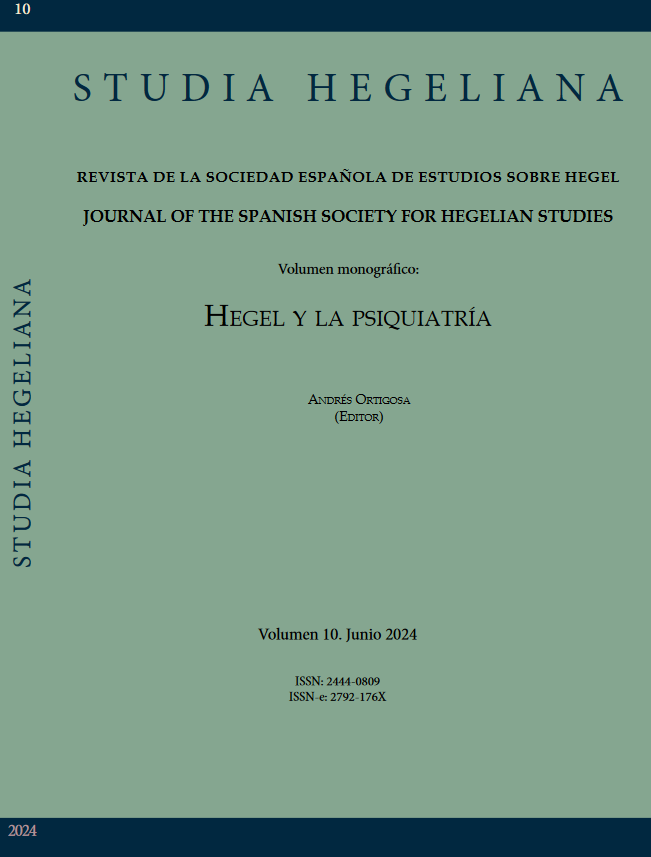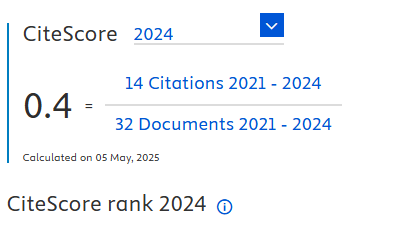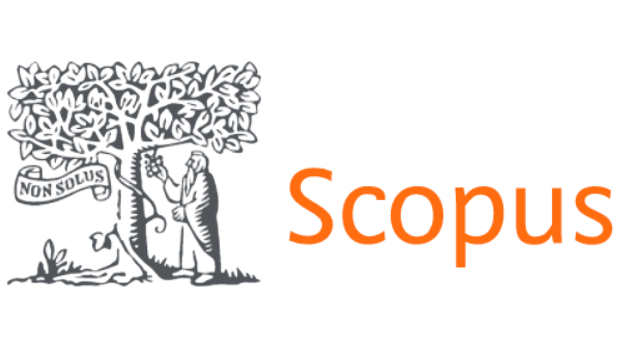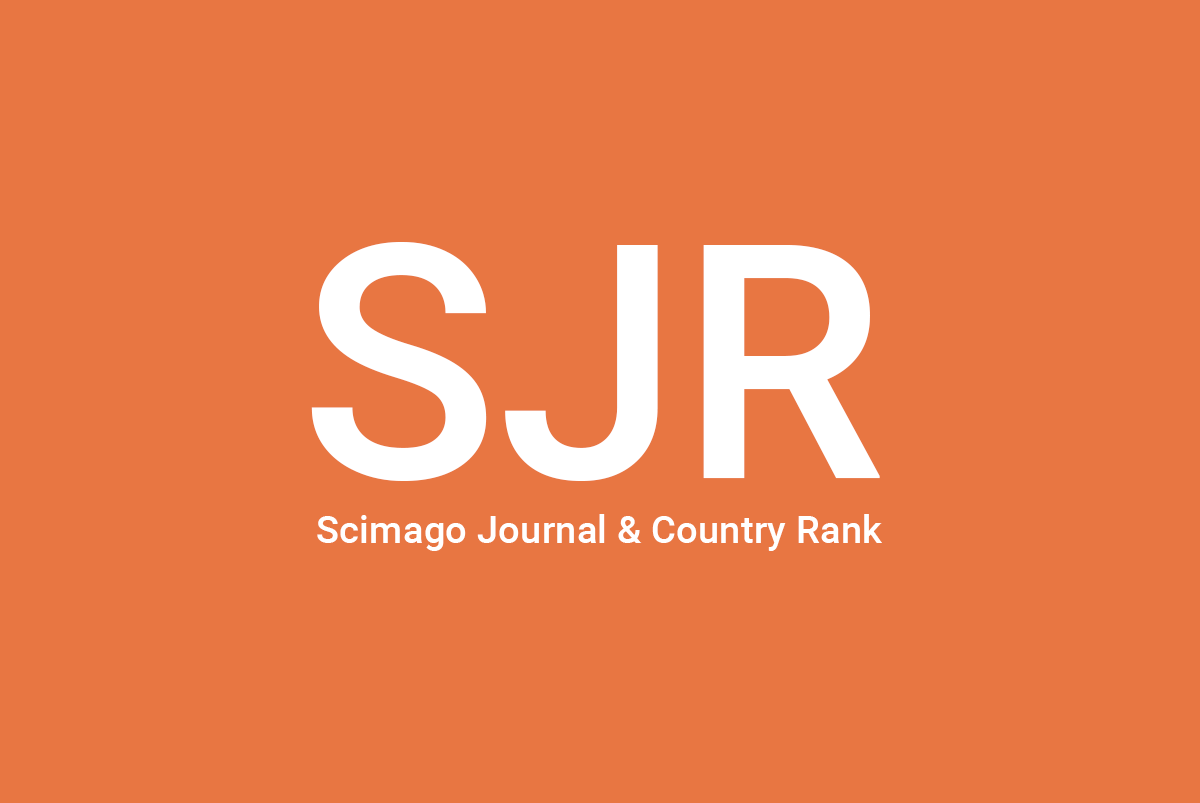Privilege as derangement
DOI:
https://doi.org/10.24310/stheg.10.2024.19309Keywords:
Subjective Spirit, Soul, Madness, Finitude, MaterialismAbstract
One of the most enigmatic phases that the subjective spirit goes through in its confrontation with the first externalities of nature is represented by madness. In this paper I am interested in delving into the "particular difficulty" that this phenomenon acquires in the transitions of the spirit towards its liberation. To this end, I will proceed in four steps: (1) I will analyze the first form that the subjective spirit assumes after the passage through the philosophy of nature, viz: the soul; (2) then, I will place the phenomenon of madness within the architecture of the spirit, as an inner manifestation of the becoming of soul´´ s life; (3) next, I will reconstruct the three ideal types of madness that Hegel distinguishes; (4) finally, and by way of conclusion, I will offer my answer to the question of the specific meaning that madness assumes for the transition to the absolute spirit.
Downloads
Metrics
Publication Facts
Reviewer profiles N/A
Author statements
Indexed in
-
—
- Academic society
- N/A
- Publisher
- Universidad de Málaga
References
Adorno, Th. Minima moralia. Traducción de Joaquín Chamorro Mielke. Madrid: Taurus, 1999.
Assalone, E. La mediación ética. Estudio sobre la filosofía del derecho de Hegel. Buenos Aires: Llanes, 2022.
Berthold-Bond, D. Hegel's Theory of Madness. New York: State University of New York Press, 1995.
Brandom, R. “Holism and Idealism in Hegel's Phenomenology”, en: R. Brandom, Tales of the Mighty Dead. Cambridge (MA): Harvard University Press, 2002.
Brauer, D. “Razón y locura en la antropología de Hegel”, Contrastes. Suplemento, Nº 15 (1) 2010, pp. 181-191.
Corti, L. “The Logical Form of a Living Organism. Hegel, Naturalism, and Biological Autonomy”, en: L. Corti y J.-G. Schülein. Nature and Naturalism in German Idealism. New York: Routledge, 2022.
Hegel, G.W.F. “Über die wissenschaftlichen Behandlungsarten des Naturrechts, seine Stelle in der praktischen Philosophie und sein Verhältnis zu den positiven Rechtswissenschaften”, en: Gesammelte Werke, Band 4, hrsg. von H. Buchner und O. Pöggeler. Hamburg: Meiner, 1968.
Hegel, G.W.F. Enzyklopädie der philosophischen Wissenschaften (1830). Hrsg. v. Fr. Nicolin u. O. Pöggeler. Hamburg: Meiner, 1969.
Hegel, G.W.F. Enciclopedia de las ciencias filosóficas (1830). Introducción, traducción y notas de Ramón Valls Plana. Madrid: Abada, 2017.
Hyppolite, J. “Hegel's Phenomenology and Psychoanalysis”, en: W. E. Steinkraus. New Studies in Hegel's Philosophy. New York: Holt, Rinehart and Winston, Inc., 1971.
Iannelli, F. y Failla, M. (Eds.) Philosophy and Madness. From Kant to Hegel and Beyond. Milán: Mimesis International, 2024.
Malabou, C. El porvenir de Hegel: plasticidad, temporalidad, dialéctica. Traducción de Cristóbal Durán. Buenos Aires: La Cebra, 2013.
Menke, Ch. Tragödie im Sittlichen. Gerechtigkeit und Freiheit nach Hegel. Frankfurt: Suhrkamp, 1996.
Neuhouser, F. Diagnosing Social Pathology. Cambridge (MA): Cambridge University Press, 2023.
Pinkard, T. Hegel's Naturalism. Mind, Nature, and the Final Ends of Life. Oxford: Oxford University Press, 2012.
Prestifilippo, A. L. “Teoría y praxis en el Hegel de Jena”, Antítesis - Revista Iberoamericana De Estudios Hegelianos, (5), 2023, pp. 49–67. DOI: https://doi.org/10.15366/antitesis2023.1.002
Siep, L. “Endlichkeit und Unendlichkeit des objektiven Geistes”, en: L. Siep, Aktualität und Grenzen der praktischen Philosophie Hegels. Aufsätze 1997-2009. Wilhelm Fink: München, 2010.
Žižek, S. “Discipline between Two Freedoms – Madness and Habit in German Idealism”, en: M. Gabriel y S. Žižek. Mythology, Madness, and Laugher. Subjectivity in German Idealism. New York: Continuum, 2009.
Downloads
Published
How to Cite
Issue
Section
License
Copyright (c) 2024 Agustín Lucas Prestifilippo

This work is licensed under a Creative Commons Attribution-NonCommercial-ShareAlike 4.0 International License.
This journal provides immediate free access to its content under the principle of making research freely available to the public. All contents published in Studia Hegeliana. Journal of the Spanish Society for Hegelian Studies, are subject to the Creative Commons Attribution-NonCommercial-ShareAlike 4.0 licence (specifically, CC-by-nc-sa), the full text of which can be found at <http://creativecommons.org/licenses/by-nc-sa/4.0>. Derivative works are therefore permitted as long as they are not used for commercial purposes. The original work may not be used for commercial purposes. The journal is not responsible for the opinions expressed by the authors of the works published in it.
It is the authors' responsibility to obtain the necessary permissions for images that are subject to copyright.
Authors whose contributions are accepted for publication in this journal retain the copyright. It is non-exclusive right to use their contributions for scholarly, research and educational purposes, including self-archiving or deposit in open access repositories of any kind.
Since volume 7 of 2021 the journal Studia Hegeliana has changed the copyright. Since that year the authors have retained the copyright.
The electronic edition of this journal is published by the Editorial de la Universidad de Málaga (UmaEditorial), being necessary to cite the source in any partial or total reproduction.







244.png)






















